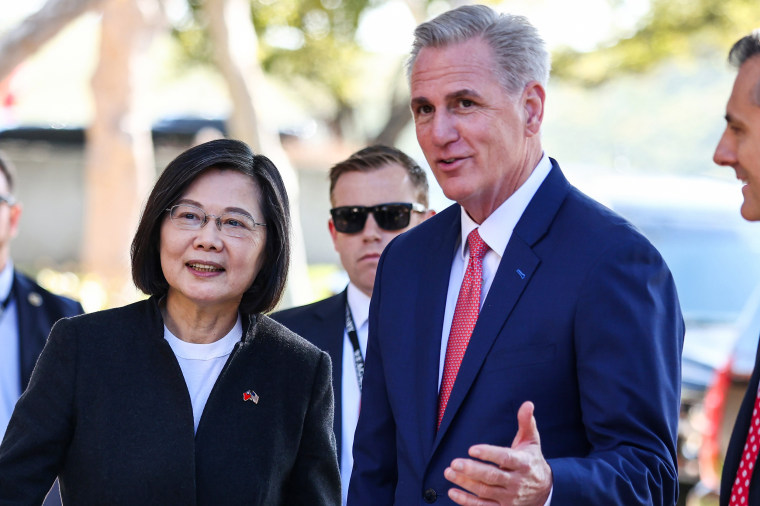House Speaker Kevin McCarthy met with Taiwanese President Tsai Ing-wen in Southern California on Wednesday, promising unwavering support for Taiwan and drawing threats of retaliation from China.
Though the United States does not have official ties with Taiwan, a self-ruling democracy that Beijing claims as its territory, it is the island’s most important international backer and has been strengthening its support as Taiwan comes under growing pressure from China. McCarthy was the most senior U.S. official to meet a Taiwanese leader on U.S. soil in decades.
“I believe our bond is stronger now than at any time or point in my lifetime and of course, President Tsai is a great champion of that bond,” McCarthy, R-Calif., told reporters after the meeting at the Ronald Reagan Presidential Library in Simi Valley, Calif.
China views such contact between U.S. and Taiwanese officials as a violation of the one-China principle, under which Washington recognizes Beijing as the sole legitimate government of China while maintaining unofficial relations with Taipei.
On Thursday, the Chinese Foreign Ministry accused Tsai and McCarthy, the third most senior U.S. government official, of promoting Taiwan independence.

“In response to the seriously wrong acts of collusion between the United States and Taiwan, China will take resolute and effective measures to defend national sovereignty and territorial integrity,” it said in a statement.
The White House says that visits by high-level Taiwanese officials are routine and that China should not use Tsai’s travel through the U.S. as a “pretext” for greater aggression against Taiwan.
“Beijing should not use the transits as an excuse to take any actions to ratchet up tensions, to further push at changing the status quo,” Secretary of State Antony Blinken said Wednesday.
As of Thursday afternoon, Beijing had not announced any large-scale military drills of the kind it held after Nancy Pelosi, McCarthy’s predecessor, visited Taiwan last August. McCarthy said Wednesday that he could still make his own visit to Taiwan in the future.
Tsai, who was transiting through the U.S. after a trip to Guatemala and Belize, said it was fitting that she and McCarthy had come together at the library honoring Reagan, whose administration was instrumental in securing assurances between the U.S. and Taiwan in 1982.
That continued support assures “the people of Taiwan that we are not isolated and we are not alone,” Tsai said, at a time of “unprecedented challenges” for both Taiwan and others.
“We once again find ourselves in a world where democracy is under threat, and the urgency of keeping the beacon of freedom shining cannot be understated,” she said.
Outside the library Wednesday, more than 100 people gathered in dueling protests between supporters of Taiwan and of China. A plane circled overhead carrying a sign that read “Taiwan is a part of China.”
Joining McCarthy in the meeting was a bipartisan group of more than a dozen lawmakers, including Rep. Pete Aguilar, D-Calif., who is a member of House Democratic leadership, and the top Republican and top Democrat on the House's new China select committee.
McCarthy praised the bipartisan approach to Taiwan and China, crediting Rep. Hakeem Jeffries of New York, the top Democrat in the House, who met with Tsai during an earlier transit stop in New York, and other Democrats for their work on the China committee.
The Tsai-McCarthy meeting is “actually a win-win-win” for China, Taiwan and the U.S., said Lev Nachman, a political scientist and assistant professor at National Chengchi University in Taipei.
It is a win for China, he said, because McCarthy is not following in Pelosi’s footsteps by traveling to Taiwan — at least for now. In a statement Wednesday, Pelosi commended the McCarthy-Tsai meeting for “its leadership” and “bipartisan participation.”
Taiwan, which lawmakers from the U.S. and elsewhere visit regularly, is seen as having successfully postponed a trip by McCarthy, who “listened and actually was able to respect what Taiwan thought was best for itself right now,” Nachman said.
But the U.S. also benefits, he said, “because McCarthy still gets to say that he met with the Taiwanese president.”
Any immediate reaction from China could be constrained as the Tsai-McCarthy meeting took place on the same day French President Emmanuel Macron arrived in Beijing for a three-day state visit. He is joined by European Commission President Ursula von der Leyen on a trip that is meant to show China a united European front on issues like trade and the war in Ukraine.
Former Taiwanese President Ma Ying-jeou, whose opposition party favors closer ties with Beijing, is also still in China on a historic 12-day visit. Chinese aggression in response to the Tsai-McCarthy meeting could erode support for Ma’s party, the Kuomintang, ahead of a presidential election in Taiwan early next year.
Tsai is scheduled to return to Taiwan on Friday.
Jennifer Jett reported from Hong Kong, Alicia Victoria Lozano reported from Los Angeles, and Aarne Heikkila reported from Simi Valley, California.

